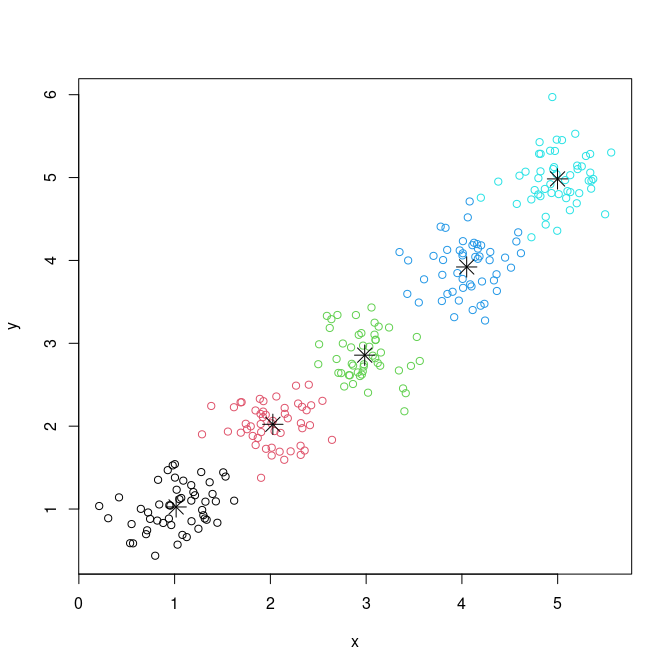This package provides R binding to a cpp implementation of the kmeans++ algorithm.
You can install the released version of tglkmeans using the following command:
install.packages("tglkmeans")Or install the development version using:
if (!require("remotes")) install.packages("remotes")
remotes::install_github("tanaylab/tglkmeans")library(tglkmeans)Create 5 clusters normally distributed around 1 to 5, with sd of 0.3:
data <- rbind(
matrix(rnorm(100, mean = 1, sd = 0.3), ncol = 2),
matrix(rnorm(100, mean = 2, sd = 0.3), ncol = 2),
matrix(rnorm(100, mean = 3, sd = 0.3), ncol = 2),
matrix(rnorm(100, mean = 4, sd = 0.3), ncol = 2),
matrix(rnorm(100, mean = 5, sd = 0.3), ncol = 2)
)
colnames(data) <- c("x", "y")
head(data)
#> x y
#> [1,] 0.9399229 0.8845469
#> [2,] 1.3150523 0.8857986
#> [3,] 1.0690177 1.1334614
#> [4,] 0.7128039 0.7431859
#> [5,] 0.4193698 1.1405633
#> [6,] 1.2876690 0.9883643Cluster using kmeans++:
km <- TGL_kmeans(data, k = 5, id_column = FALSE)
km
#> $cluster
#> 1 2 3 4 5 6 7 8 9 10 11 12 13 14 15 16 17 18 19 20
#> 1 1 1 1 1 1 1 1 1 1 1 1 1 1 1 1 1 1 1 1
#> 21 22 23 24 25 26 27 28 29 30 31 32 33 34 35 36 37 38 39 40
#> 1 1 1 1 1 1 1 1 1 1 1 1 1 1 1 1 1 1 1 1
#> 41 42 43 44 45 46 47 48 49 50 51 52 53 54 55 56 57 58 59 60
#> 1 1 1 1 1 1 1 1 1 1 2 2 2 2 2 2 2 2 2 2
#> 61 62 63 64 65 66 67 68 69 70 71 72 73 74 75 76 77 78 79 80
#> 2 2 2 2 2 2 2 2 2 2 2 2 2 2 2 2 2 2 2 2
#> 81 82 83 84 85 86 87 88 89 90 91 92 93 94 95 96 97 98 99 100
#> 2 2 2 2 2 2 2 2 2 2 2 2 2 2 2 2 2 2 2 2
#> 101 102 103 104 105 106 107 108 109 110 111 112 113 114 115 116 117 118 119 120
#> 3 3 3 3 3 3 4 3 3 3 3 3 3 3 3 3 3 3 3 3
#> 121 122 123 124 125 126 127 128 129 130 131 132 133 134 135 136 137 138 139 140
#> 3 3 3 3 3 3 3 3 3 3 3 3 3 3 3 3 3 3 3 3
#> 141 142 143 144 145 146 147 148 149 150 151 152 153 154 155 156 157 158 159 160
#> 2 3 3 3 3 3 3 3 3 3 4 4 4 4 4 4 4 4 4 4
#> 161 162 163 164 165 166 167 168 169 170 171 172 173 174 175 176 177 178 179 180
#> 4 4 4 4 4 4 4 4 4 4 4 4 4 4 5 4 5 4 4 4
#> 181 182 183 184 185 186 187 188 189 190 191 192 193 194 195 196 197 198 199 200
#> 4 4 4 4 4 4 4 4 4 4 4 4 4 4 4 4 4 4 4 4
#> 201 202 203 204 205 206 207 208 209 210 211 212 213 214 215 216 217 218 219 220
#> 5 5 5 5 5 5 5 5 5 5 5 5 4 5 5 5 5 5 5 5
#> 221 222 223 224 225 226 227 228 229 230 231 232 233 234 235 236 237 238 239 240
#> 5 5 5 5 5 5 5 5 5 5 5 5 5 5 5 5 5 5 5 5
#> 241 242 243 244 245 246 247 248 249 250
#> 5 5 5 5 5 5 5 5 5 5
#>
#> $centers
#> x y
#> [1,] 1.015769 1.025221
#> [2,] 2.025743 2.022156
#> [3,] 2.985030 2.857020
#> [4,] 4.049870 3.921439
#> [5,] 4.998449 4.983747
#>
#> $size
#> 1 2 3 4 5
#> 50 51 48 50 51Plot the results:
plot(data, col = km$cluster)
points(km$centers, pch = 8, cex = 2)Please refer to the package vignettes for usage and workflow, or look at the usage section in the site.
browseVignettes("usage")From version 0.4.0 onward, the package uses R random number generation
functions instead of the C++11 random number generation functions. Note
that this may result in different results from previous versions. To get
the same results as previous versions, set the use_cpp_random argument
to TRUE in the TGL_kmeans function.
